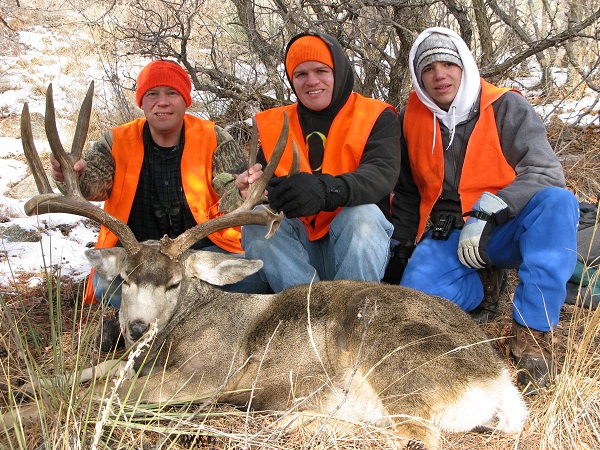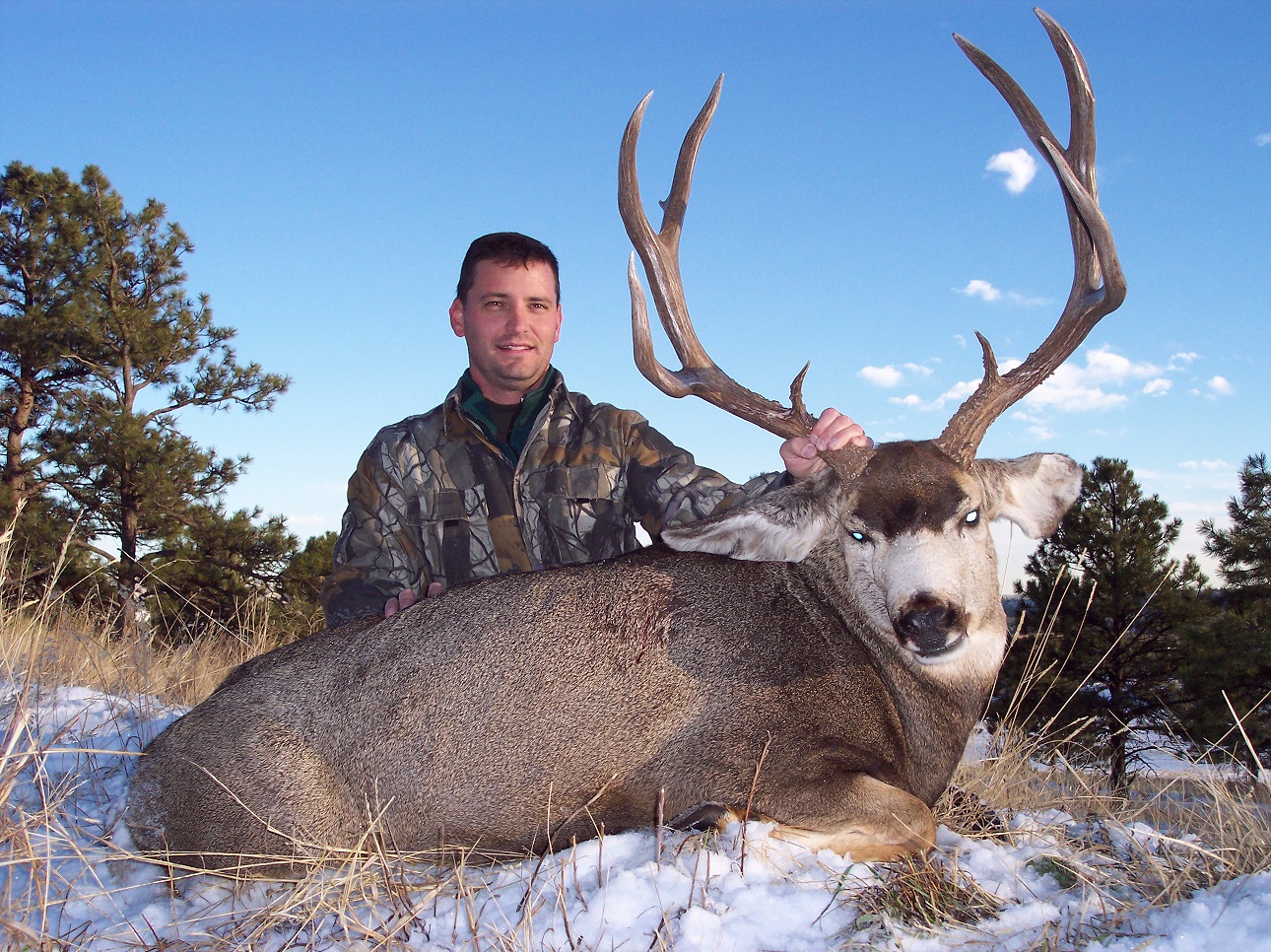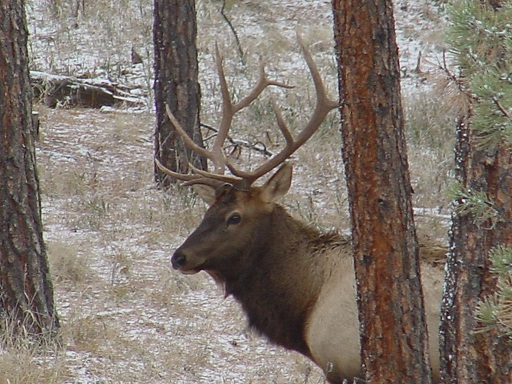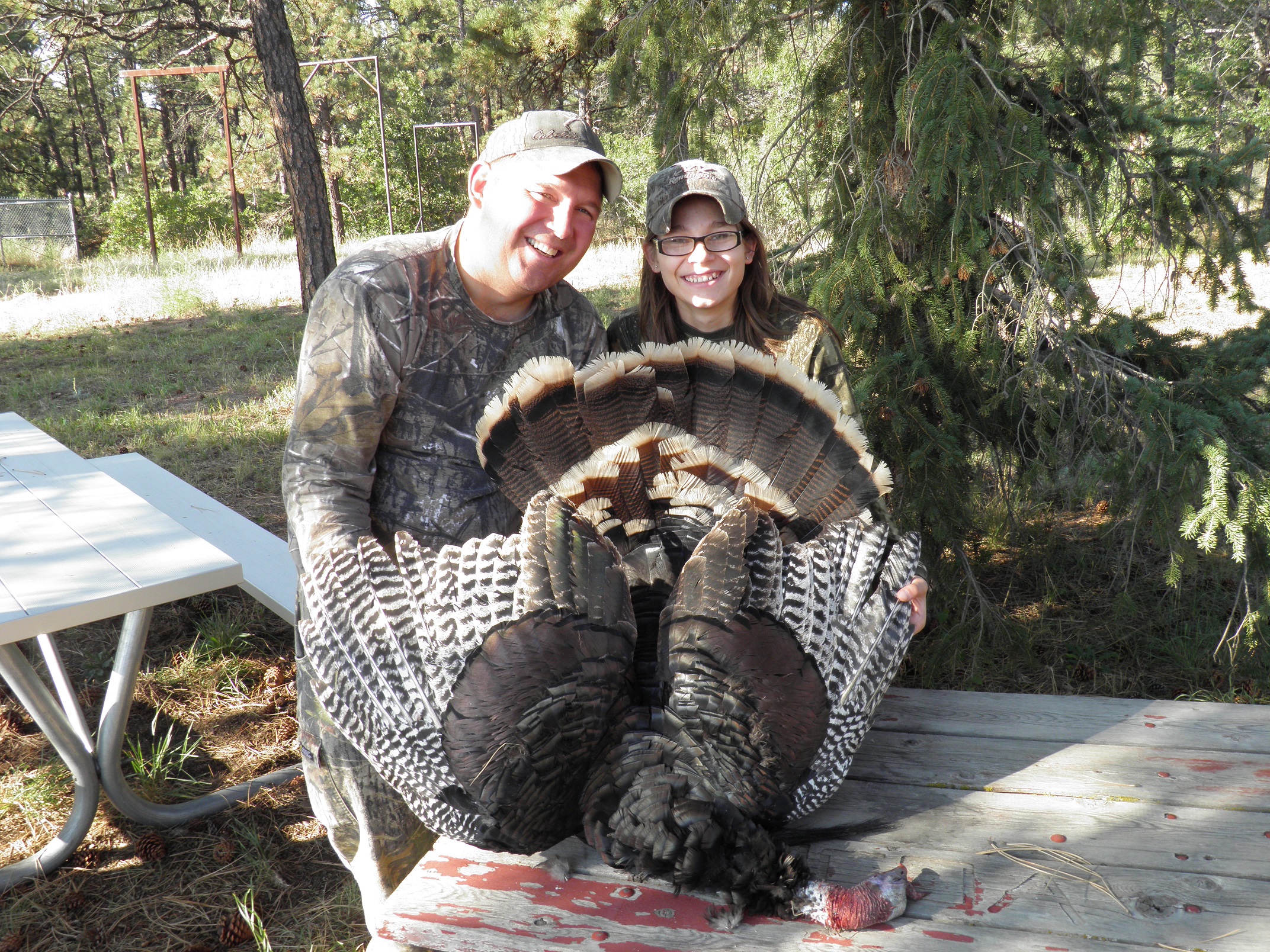Hunting
The Air Force Academy uses hunting to manage the deer, elk, and turkey populations to  protect habitat, promote animal health, reduce vehicle-wildlife accidents and airfield flight risk, or other human conflicts. Annual population and harvest objectives for the Academy (Game Management Unit 512) is closely coordinated with Colorado Parks and Wildlife. Hunter harvest data since 1959 is summarized here. Per USAFA Plan 31-1 (IDP) - Protection and Control of Privately Owned Firearms, hunters are not allowed to access Unit 511, west of the base, with a firearm or bow.
protect habitat, promote animal health, reduce vehicle-wildlife accidents and airfield flight risk, or other human conflicts. Annual population and harvest objectives for the Academy (Game Management Unit 512) is closely coordinated with Colorado Parks and Wildlife. Hunter harvest data since 1959 is summarized here. Per USAFA Plan 31-1 (IDP) - Protection and Control of Privately Owned Firearms, hunters are not allowed to access Unit 511, west of the base, with a firearm or bow.
There is no small game, waterfowl, prairie dog, furbearer, black bear, or mountain lion hunting offered on the Academy.
Detailed information on Colorado's hunting opportunities, regulations, and application process is available at cpw@state.co.us. Colorado Parks and Wildlife has also assembled a useful list of other online resources, including instructions on field dressing game and field mapping tools.
2025 Cow Elk Rifle Hunt Drawing Results
The following 10 permit applications were randomly drawn for the October 1, 2025 - January 31, 2026 cow elk hunt from a pool of 519 applicants: 316727, 566317, 260046, 665822, 672248, 663270, 156378, 636901, 569644, 668460. All successful applicants will also be notified by mail and/or email.
2025 White-Tailed Deer Archery Drawing Results
The following 25 permit applications were randomly drawn for the December 1 - December 31 white-tailed deer archey hunt from a pool of 173 applicants: 696585, 668555, 614663,475401, 609588, 471834, 465122, 638845, 662926, 352985, 199380, 664346, 687961, 687958, 167847, 228233, 316276, 355643, 566317, 227370, 386023, 664909, 672810, 316306, 230087. All successful applicants will also be notified by mail and/or email.
General Guidelines and Procedures
Lotteries and Permits: All persons are eligible to apply for the Academy's cow elk, turkey and white-tailed deer lotteries, and the State's limited deer licenses. Hunting is open to the general public and there is no license preference given to active duty military, veterans, youth, or disabled hunters. In addition to a State game license, a base hunting access permit ($25 elk, $15 deer, $10 turkey) must be purchased through iSportsman following these instructions.
For safety and security reasons, deer and elk rifle hunters are escorted by Air Force Academy, US Fish and Wildlife Service, and Colorado Parks and Wildlife staff; or other approved volunteers. Under the direction of an escort, hunters may pursue big game throughout their scheduled hunt. Escorts do not instruct hunters to harvest a particular animal. The escorts transport hunters to the prime game areas in GOV vehicles, but public safety and security often dictates when and where hunting can occur. Escorts will provide helpful instruction, however, hunters are expected to understand how to safely operate their firearm and the basics of field dressing game.
Hunters (and any guests) must receive a safety briefing from Natural Resources staff before going to the field. Hunters and guests must also complete an Assumption of Risk waiver form. Guests on the rifle hunts are only allowed on a space-available basis and must be 12+ years of age.
A firearm may be discharged only after the escort has determined the deer or elk presents a safe and reasonable shot based on distance, direction, and physical backstop. Hunters that do not not comply with the escort's directions, or are otherwise hunting in an unsafe or unethical manner, will have their access permit revoked.
Hunting areas available for rifle deer and elk are shown here. The hunting areas cover many different types of habitat, terrain, and ease of walk-in or drive-in access. Hunters should be physically capable of pursuing game over steep, uneven ground. Natural Resources will provide assistance and reasonable accomodations for mobility-impaired hunters.
Mule Deer and White-Tailed Deer (Rifle-only)
The Academy offers two December weekend hunts of TWO-DAYS each.  This limited hunting period is intended to help emphasize the use of hunting as a population management tool, rather than encouraging a highly selective harvest of “trophy” buck deer. Hunters can harvest any deer they choose, including a “trophy” buck, but passing on deer with the intent of pursuing a larger-antlered animal could result in an unfilled tag. Doe hunters are also limited to two-day hunts, but this typically does not affect the harvesting of a deer.
This limited hunting period is intended to help emphasize the use of hunting as a population management tool, rather than encouraging a highly selective harvest of “trophy” buck deer. Hunters can harvest any deer they choose, including a “trophy” buck, but passing on deer with the intent of pursuing a larger-antlered animal could result in an unfilled tag. Doe hunters are also limited to two-day hunts, but this typically does not affect the harvesting of a deer.
Hunters must draw a GMU 512 (Air Force Academy) deer license through the Colorado Parks and Wildlife application process. Hunters who successfully draw will receive a letter and/or email from the base (typically in June) with important instructions. Preference points are necessary to draw a deer license for the Academy.
A few deer harvested from the Air Force Academy have tested positive for chronic wasting disease (CWD).
White-Tailed Deer (Archery-only) (New for 2025)
Unlike the rifle deer and elk hunting, the archery white-tailed deer hunters are not escorted, therefore hunters must comply with the safety and security requirements described below. The designated archery hunting deer units are shown here.
Application, Drawing, and Season: To enter the lottery for a base permit to archery hunt white-tailed deer with a state over-the-counter license, you must sign-up through iSportsman ($6 application fee) from August 1 - October 15. The first twenty (20) drawn applicants are notified with a letter and/or email in late-October that covers important information on hunting procedures, base access, and safety requirements. The base's archery white-tailed deer season is December 1-31.
Mandatory safety and security requirements:
- Hunters must schedule an in-person briefing with Natural Resources staff to review the hunting procedures and safety and security requirements.
- Hunters (and guests) without DoD identification must coordinate with Natural Resources staff for a 30-day Visitor Pass.
- Hunters must download the Avenza Maps smartphone app and upload a geo-referenced map of the archery deer hunting areas. Natural Resources staff will provide assistance with uploading and utilizing the app at the in-person briefing.
- Hunters must check-in/out of the hunting areas each day using iSportsman.
A bow and arrows meeting the state's regulations is required for hunting white-tailed deer. The use of a cross-bow is allowed with a state-approved medical waiver.
American Elk (Rifle-only)
Cow elk hunting is offered October 1 through January 31, Monday-Friday.  To enter a lottery drawing for an over-the-counter cow elk "B" license, purchase the lottery application permit through iSportsman between January 1st and May 31st. The first ten randomly drawn applicants are notified by letter and/or email in mid-June and contacted in priority order when the season begins. Successful applicants will receive a Colorado Parks and Wildlife cow elk voucher from Natural Resources to purchase a license through a state licensing agent. The cow elk licenses are additional tags that do not require preference points to be drawn. An average of 4 elk per year have been harvested in GMU 512 since 2001.
To enter a lottery drawing for an over-the-counter cow elk "B" license, purchase the lottery application permit through iSportsman between January 1st and May 31st. The first ten randomly drawn applicants are notified by letter and/or email in mid-June and contacted in priority order when the season begins. Successful applicants will receive a Colorado Parks and Wildlife cow elk voucher from Natural Resources to purchase a license through a state licensing agent. The cow elk licenses are additional tags that do not require preference points to be drawn. An average of 4 elk per year have been harvested in GMU 512 since 2001.
There is no guarantee if you are one of the first ten drawn applicants that you will receive a license voucher. Elk hunting is only conducted as-needed to meet population and habitat objectives.
Elk hunters are expected to be available on short notice (12-24 hours) when the herd of typically 30-40 animals is on-base. Hunters may decline an opportunity to hunt only once and still retain their priority ranking. Natural Resources tries to make reasonable accommodations for work schedules, vacations, illness, school commitments, etc.
Merriam's Turkey (Archery-only)

Unlike the rifle deer and elk hunting, turkey hunters are not escorted, therefore hunters must comply with the safety and security requirements described below. The designated turkey hunting units are shown here.
Spring Season: To enter the lottery to hunt spring turkey with a state over-the-counter license, you must sign-up through iSportsman ($6 application fee) from January 1st - February 28. The first twenty (20) drawn applicants are notified with a letter and/or email in early-March that covers important information on the hunting procedures, base access, and safety requirements.
Fall Season: To enter the lottery to hunt fall turkey with a state over-the-counter license, you must sign-up through iSportsman ($6 application fee) from June 1 - July 31. The first twenty (20) drawn applicants are notified with a letter and/or email in early-August that covers important information on the hunting procedures, base access, and safety requirements. The Academy follows the state's Fall season dates for west of Interstate 25.
Mandatory safety and security requirements:
- Hunters must schedule an in-person briefing with Natural Resources staff to review the hunting procedures and safety and security requirements.
- Hunters (and guests) without DoD identification must coordinate with Natural Resources staff for a 30-day Visitor Pass.
- Hunters must download the Avenza Maps smartphone app and upload a geo-referenced map of the Air Force Academy's turkey hunting areas. Natural Resources staff will provide assistance with uploading and utilizing the app at the in-person briefing.
- Hunters must check-in/out of the hunting areas each day using iSportsman. To enhance safety and limit interaction between hunters, only a single hunter may occupy a hunting unit at a time. Some areas may occassionally be closed for training exercises or other events.
A bow and arrows meeting the state's requirement is the only legal method of hunting turkey on the Air Force Academy. The use of a cross-bow is allowed with a state-approved medical waiver. Rookie Sportsman hunters, escorted by Colorado Parks and Wildlife staff, may hunt with a bow or shotgun.
Shed Antler Collection
Consistent with Colorado Parks and Wildlife regulations, antler shed collection and possession on the Air Force Academy and Farish Recreation Area is prohibited from January 1 - April 30. Antler collection and possession is allowed May 1 - Dec 31 in areas open to the public and military with proper identification.
Wildlife Roadkill Salvage List
Numerous deer (and sometimes elk) are struck by vehicles each year and many of these animals are salvageable for human consumption. Natural Resources holds an in-person sign-up (one entry per household) the first Monday in August at Building 9030 to maintain a current salvage list. The 10th Security Forces or Natural Resources office will call people on the list in priority order to pick-up any salvageable deer or elk. The animals must be retrieved promptly as they are not field dressed. See the Events and Services section on the Home page for the upcoming August sign-up date and time.